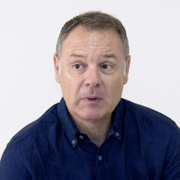Spanish Sociologist Discusses the Dialectic of Structure and the Environment at the IEA
The organization of modern societies around the idea of “unlimited” growth generates a steady accumulation of goods and materials, the consequence of which has been social exclusion and an environmental crisis. The social sciences have the vital role of questioning this model that shaped the way we see the world.
To demonstrate some conclusions of his thoughts on this issue, Antonio Aledo Tur, professor of Sociology of the Environment at the Universidad de Alicante (Spain), will hold in the IEA’s Events Room a debate and a discursive analysis of what has taken place in Brazil with regard to dams. El Paradigma de la Modernidad y sus Impactos Socioambientales [The Paradigm of Modernity and its Socio-Environmental Impacts] is the theme of the conference, which will be held on September 23, from 10 am to 12 pm. The lecture (given in Spanish, without translation) is organized by the IEA’s Environment and Society Research Group, coordinated by Pedro Jacobi, from USP’s School of Education.
 |
|---|
| Antonio Aledo Tur, a specialist in sociology of tourism and environmental sociology |
Aledo Tur’s research focuses on the dialectic between the imposition of the structures and the human ability to adapt to them, regardless of whether they are environmental, social, economic, political or cultural.
His master’s dissertation, The Colonization of Yucatan through its Vernacular Architecture (Louisiana State University, 1992), and his doctoral thesis, El Entorno de Conquista (University of Alicante, 1997), show how the structures of architecture and urbanism establish a dialogue with the structures of the process of conquest and colonization of Mayan lands in the Yucatan region.
In recent studies, Aledo Tur has turned his attention to tourism, seen as an activity that transformed the region and the society of Alicante. Research on residential tourism on the Spanish coast unfolded into analyses of the same subject in Brazil’s northeastern seaboard. This type of tourism has been a driver of employment and income generation in several Spanish and Brazilian coastal towns. But it is also having serious social and environmental impacts, especially because of the lack of planning that characterizes the constructions of this kind of enterprise.
In addition to studies in the Sociology of Tourism, Aledo Tur has also dedicated himself to a line of research in the field of Environmental Sociology, where he specialized in analyses of the social and environmental impacts of major public works, such as dams and reservoirs, using participatory methods to diagnose the impacts. In particular, he has focused on the social impacts of the Panama Canal Expansion Project (2005-2006). In the light of political ecology, he analyzed the impact of large hydroelectric plants in the Paraná River, Brazil.
The conferencist
Aledo Tur graduated in Geography and History from the University of Alicante. He holds a master’s degree in Anthropology from Louisiana State University and a Ph.D. in Sociology from the University of Alicante. He was professor of Anthropology at the Catholic University of Murcia and at the University of Alicante. He is currently responsible for the disciplines of Environment and Methods and Techniques of Social Research in Tourism at Alicante, where he also coordinates the doctoral program of the Sociology department. He is coordinator of the Society and Environment Group of the Spanish Federation of Sociology, and of the Network of Spanish Environmental Sociologists.
On April 18, 2013, he took part in the IEA’s conference on the problems of the Spanish Mediterranean, when he gave the lecture La Incuestionabilidad del Riesgo: El Modelo Inmobiliario Español y la Gestión Política de los Territorios y Comunidades Costeras.
